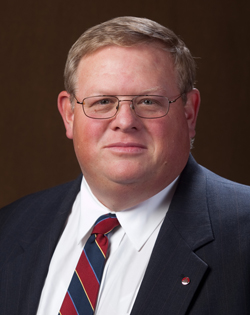Recently retired VP reflects on career at WKU
July 2, 2020
After spending four decades on the hill, Brian Kuster has said goodbye.
Kuster served as WKU’s vice president for Enrollment and Student Experience for four years before retiring on Tuesday, but his involvement with the university dates back to when he started his studies as a Hilltopper in 1980.
After receiving a bachelor’s degree in finance and a master’s degree in student personnel services, Kuster began to rise through the ranks of what is now known as Housing and Residence Life. He became a residence hall director in 1985 and when the Housing and Residence Life departments merged together in 1998, he was appointed as the new department’s first director.
“I was in Housing for 31 of my 35 years at Western, and to see the former (resident assistants) or former hall directors that have been very successful, I’m proud of that,” Kuster said.
Kuster took on his latest role at WKU after President Timothy Caboni merged the Student Affairs and Enrollment Management divisions into the Division of Enrollment and Student Experience. Kuster said that he had planned on retiring in 2018, but Caboni persuaded him to remain on campus for a few years.
“Brian has invested his life into this university,” Caboni said in a Board of Regents meeting on June 26. “Every day, Brian shows up and treats our 20,000 students as his own kids.”
For the past few years, Kuster has had to persevere through multiple operations on his knees.
“I’ve had my left knee replaced, I guess four years ago, and I just had bone on bone in my right knee,” Kuster said. “So I just had a lot of pain and difficulty (while) walking and doing physical activities, and so I needed to get that fixed.”
Kuster’s right knee was replaced on June 9. He said that his knee replacements did not affect his decision to retire on Tuesday.
“I’m doing therapy three times a week and it’s going really well,” Kuster said.
Kuster’s work at WKU has gone beyond the Division of Enrollment and Student Experience. A year after becoming the director of Housing and Residence Life, Kuster signed on with another new organization within the university.
In 1999, Kuster was named as the executive director of the WKU Student Life Foundation. The Student Life Foundation is a nonprofit organization that pays for the construction and renovation of residence halls on WKU’s campus. Kuster said that the Student Life Foundation has benefited the university because WKU does not have to rely on the Kentucky state legislature to approve housing projects, and the foundation’s only revenue stream comes from housing fees that students are required to pay.
“If you look at the housing rates at other schools, our rates are lower than half of the schools in the state,” Kuster said. “And our facilities are in better condition than the vast majority of the schools in the state.”
The First Year Village, which will be open to students in the fall of 2021, is part of a 10-year housing plan that the Student Life Foundation embarked on four years ago. Kuster believes the First Year Village could help increase student enrollment in the future because the students living in that area will be housed in a Living Learning Community pod with 25 to 26 students.
“From all the research that we’ve seen, Living Learning Communities definitely help with retention of students, and it helps them find a sense of belonging, a sense of place at the institution, and I think that’s a big part of their retention,” Kuster said.
Kuster’s replacement as the vice president for Enrollment and Student Experience will be Ethan Logan, who was previously the associate vice president for Enrollment Management at Texas Tech University.
“I think he’s who Western needs now,” Kuster said. “He’ll listen to the staff and will allow them to grow in their positions, but also help develop them in the areas that they need work in.”
Kuster believes that his experiences at WKU have been very meaningful.
“You don’t work some place for 35 years and not become entrenched,” Kuster said. “It’s more than a job.”















